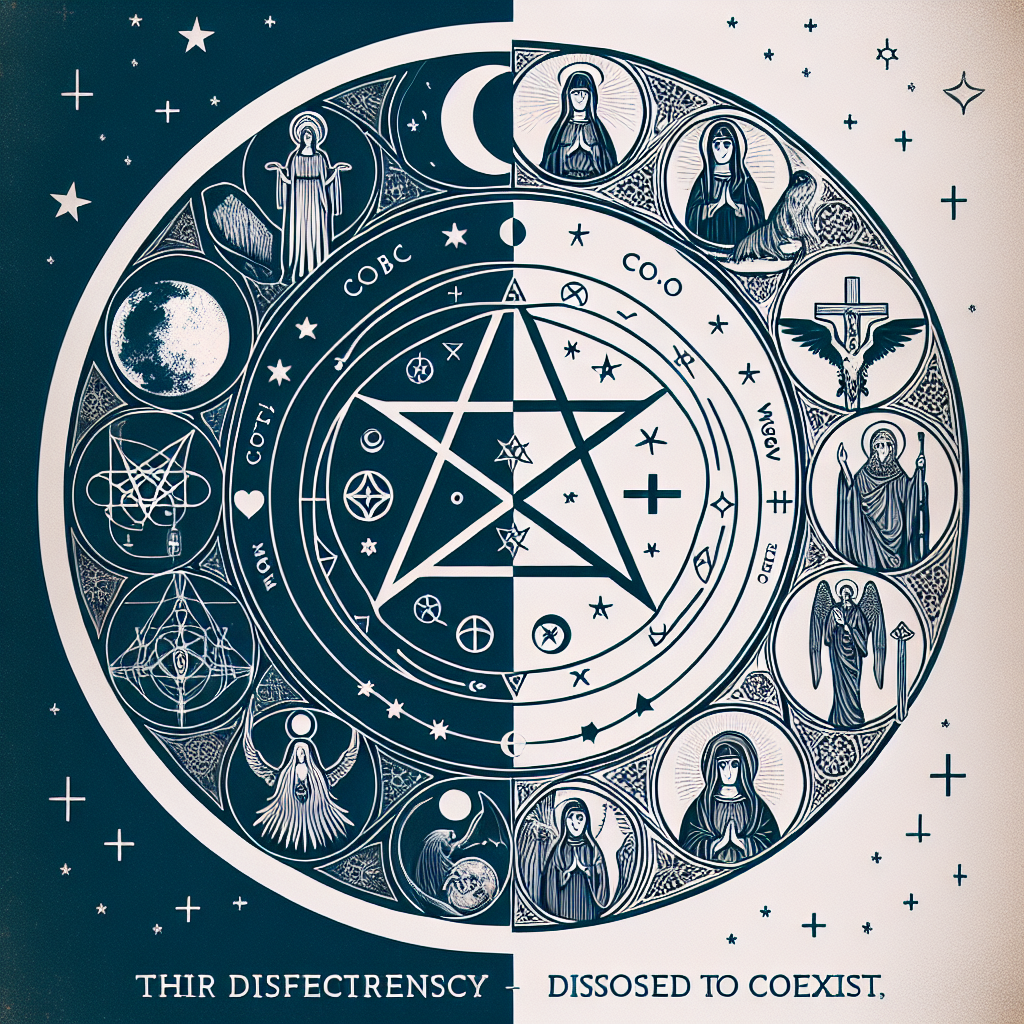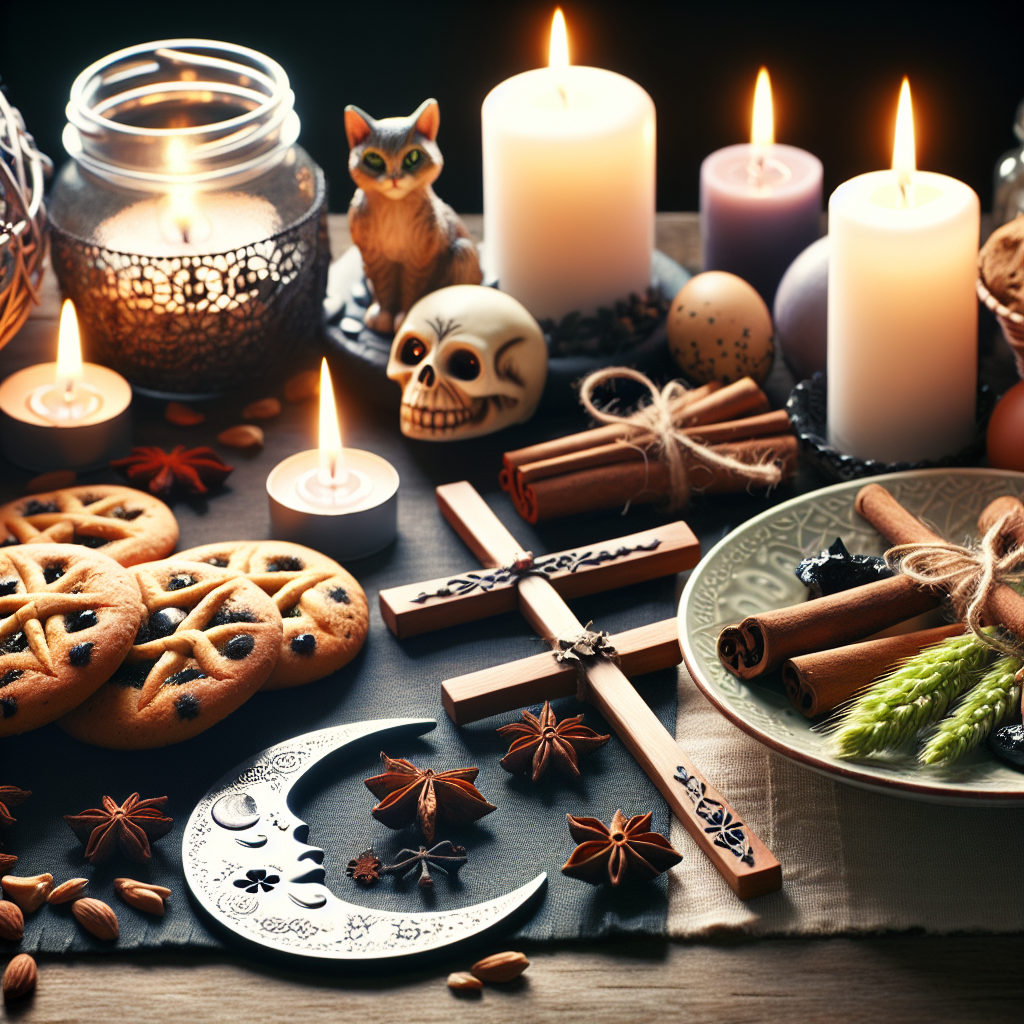As an Amazon Associate I earn from qualifying purchases.
Wicca, a modern pagan religion that celebrates nature and incorporates beliefs and rituals often associated with pre-Christian traditions, was first introduced to the public in the early 1950s by Gerald Gardner. Though it draws from older beliefs and practices, Wicca is distinct from Christianity. Christianity is a monotheistic religion based on the life and teachings of Jesus Christ as described in the New Testament. It is centered around the belief in one God and the redemption of humanity through Jesus’s sacrifice.
The roots of Wicca can be traced back to Gardner and his experiences in British occult and esoteric circles. Wicca often involves worship of a goddess and a god, ritual magic, and a decentralized, eclectic approach to spirituality. Despite the fact that Wicca is a relatively new religious movement, it has grown substantially since its inception, with adherents practicing independently or in organized groups known as covens. Although it takes inspiration from ancient practices and folklore, Wicca diverged from the Christian cultural milieu from which it originated in the 20th century. Its practices do not align with the Christian doctrines of monotheism, the divinity of Christ, or the structure of the Christian Church.
Religious identity in Wicca is diverse, with some Wiccans identifying closely with specific deities or pantheons from various cultural backgrounds, while others follow a more eclectic spiritual path that draws from multiple sources. The respect for individual belief within Wicca stands in contrast to the more defined dogma typically associated with Christian denominations. Wiccans regularly engage in rituals that celebrate the changing of the seasons and phases of the moon, which are typically marked by holidays known as Sabbats and Esbats, features that do not overlap with Christian holidays or observances.
Distinctions between Wicca and Christianity are numerous, but perhaps one of the most recognizable is the Wiccan Rede, which states “An it harm none, do what ye will.” This ethical guideline promotes freedom and personal responsibility, which is different from the Christian moral code that is largely derived from biblical commandments and teachings. Furthermore, an interesting statistic reflecting Wicca’s presence in the U.S. indicates that its number of adherents doubled between 1990 and 2001, making it one of the fastest-growing religions at the start of the 21st century, according to the American Religious Identification Survey.
In summary, while Wiccans and Christians share the characteristic of seeking spiritual connection and moral guidance through their respective religions, the foundations, practices, and beliefs associated with each are distinct. Understanding the differences between Wicca and Christianity is key to appreciating the diverse tapestry of religious identities in the modern world. Engaging with the tenants of both religions can offer insights into the varied ways that humans look for meaning, community, and connection in their spiritual lives.
“`html
Is Wicca a Form of Christianity? Exploring Differences in Religious Beliefs
“`
Wicca and Christianity are two distinct religious paths with unique beliefs, practices, and histories. While Christianity is centered around the life and teachings of Jesus Christ and is monotheistic, Wicca is typically a polytheistic or duotheistic faith that reveres nature and places emphasis on the divine in many forms, including a God and Goddess. Wiccans practice rituals and celebrate seasonal festivals within a framework that often includes magic and a deep respect for the Earth. The two religions diverge significantly in theology, rituals, and worldview, which makes it clear that Wicca is not a denomination or subset of Christianity. In the following sections, we’ll delve deeper into the origins, core beliefs, and practices of Wicca to better understand how it stands apart from Christian doctrine.
Are Wiccans Christian? Understanding Religious Identity
Wicca, as a modern Pagan religion, arose in the early-to-mid-20th century and is distinct from Christianity in both beliefs and practices. Wiccans typically follow a polytheistic or pantheistic system of beliefs, honoring a Goddess and a God, along with various other deities. Unlike Christianity, which is monotheistic and worships one God, Wiccans embrace a more diverse pantheon and the spiritual connection to nature.
The historical roots of Wicca are often traced back to pre-Christian, pagan traditions. Despite this connection, Wicca as practiced today is a new religious movement, formulated by figures such as Gerald Gardner in the mid-20th century. While some Wiccans may incorporate Christian elements or symbols into their personal spirituality, the religions are fundamentally different.
Wicca emphasizes the cycles of nature, the phases of the moon, seasonal festivals known as sabbats, and esbat rituals, which are not celebrated in Christian tradition. Wiccans also practice magic and hold a belief in the law of Threefold Return, which posits that whatever energy a person puts out into the world, be it positive or negative, will be returned threefold. This contrasts with the Christian practice of prayer and the biblical laws of sowing and reaping.
One key factor that sets Wiccan spirituality apart from Christianity is the absence of sacred texts similar to the Christian Bible. Wiccans may refer to various sources for their spiritual practice, such as the Book of Shadows, which is a personal collection of spells, rituals, and magical insights but does not have the universal authority that the Bible holds within Christianity.
Another distinction lies in the clergy structure. In general, Wiccan groups operate with more autonomy compared to the hierarchical structure of many Christian denominations. Wiccan clergy, such as High Priests and Priestesses, gain their positions through training and personal spiritual practice rather than through a formal ecclesiastical ordination as seen in Christian churches.
It’s also important to note that while both Wiccans and Christians engage in community worship, their rituals and the symbolism they employ are quite different. Wiccan rituals are often centered around a sacred circle and involve the invocation of the elements (earth, air, fire, and water), the Goddess, and the God. These practices exist outside of the liturgy and sacraments central to Christian worship.
Given these divergences, it is clear that Wiccans are not Christians, even if individuals may find personal connections or shared values across both religions. Wiccans have their own unique set of beliefs and practices that define their religious identity, which is separate from that of Christian doctrinal teachings.
While the percentage of Wiccans varies globally, the Pew Research Center’s report on religious landscapes from recent years indicates that roughly 0.4% of Americans identify as Pagan or Wiccan. This statistic underscores the distinct minority status of Wiccans in a predominantly Christian country and highlights the ongoing importance of understanding the nuances of various religious identities.
1.
Q: Can a person be both a practicing Wiccan and a Christian?
A: Generally, Wicca and Christianity are viewed as separate religious paths with different belief systems. While Wiccans can appreciate or respect Christian teachings, it is uncommon for someone to fully practice both religions due to fundamental differences in theology and worship.
2.
Q: Do Wiccans believe in the Christian concept of God?
A: Wiccans usually believe in a dualistic form of deity, often represented as a Goddess and a God, which differs from the Christian monotheistic belief in a single God. Their deities are connected to nature and the earth, rather than the Christian God’s association with the Biblical creation and salvation narrative.
3.
Q: Are there any similarities between Wicca and Christianity?
A: While primarily different, Wicca and Christianity can share a common ethic such as the “Golden Rule” or treating others with respect and love. Both may also practice rituals, though the content and purposes of these rituals are distinct to each religion.
4.
Q: Is Wicca a recognized religion like Christianity?
A: Yes, Wicca is recognized as an official religion in many countries and enjoys the same legal rights as Christianity and other faiths. It emerged in its modern form in the mid-20th century and has steadily gained recognition since then.</Twitter's Legal Team
5.
Q: Do Wiccans celebrate Christian holidays like Easter and Christmas?
A: Wiccans observe their own set of holidays, primarily based on the Wheel of the Year, which is connected to seasonal changes and agricultural cycles. While some Wiccans may participate in Christian holidays culturally, they are not part of the Wiccan religious practice.
6.
Q: Can Wiccans use the Bible in their practice?
A: Most Wiccans do not incorporate the Bible into their practices, as it is a Christian text. Wiccans typically use their own set of sacred texts or writings influenced by various sources including pre-Christian paganism, folklore, and modern writings on Wicca.
7.
Q: How do Wiccans view Jesus Christ?
A: Wiccans may view Jesus as a spiritual teacher or a wise figure, but they do not view him as the Savior or Son of God as Christianity does. He is not worshipped or held as central to Wiccan beliefs or practices.
8.
Q: Is witchcraft a part of Christian practice?
A: No, witchcraft, as understood in the Wiccan context, is not part of Christian practice. The Bible specifically condemns witchcraft, and traditional Christian denominations do not include it in their teachings or rituals.
9.
Q: What do Christians think about Wicca?
A: Opinions among Christians about Wicca can vary widely. Some see it as diametrically opposed to Christian teachings, while others may be more tolerant or interested in interfaith dialogue. Views will differ depending on individual beliefs and denominational teachings.
10.
Q: How should someone interested in both Wicca and Christianity approach their spiritual path?
A: Someone interested in both paths should research and reflect on both sets of beliefs, and consider speaking with religious leaders or practitioners from both communities. Personal spiritual journeys are unique, and an individual approach to faith and practice is essential to forming one’s own religious identity.

Conclusion
Wiccans are not Christians; they follow a distinctly different spiritual path that is rooted in pagan traditions and Earth-based spirituality. Key points illustrate that Wicca is a modern religious movement which takes inspiration from pre-Christian paganism and folkloric witchcraft, incorporating elements such as polytheism, animism, and a deep reverence for nature. Wicca’s diverse pantheon, embracing multiple deities, stands in contrast to the monotheism of Christianity. Furthermore, Wicca’s ethical framework, often encapsulated by the Wiccan Rede’s injunction to “harm none,” shows a focus on individual responsibility, which differs from Christian notions of sin and redemption through a divine savior.
The article also emphasized the importance of personal experience and autonomy in Wiccan practice, contrasting with the Christian reliance on scripture and ecclesiastical authority. Wiccan rituals and spells are means of personal expression and influence, fostering a direct connection to the divine forces, as opposed to the Christian sacraments mediated by the institutional church. Despite superficial similarities like the use of ritual, altars, or the celebration of seasonal festivals, the theological underpinnings and cosmic views of Wiccans and Christians are fundamentally different. It is clear that while Wiccans may respect or incorporate elements from a variety of religious traditions, they constitute a separate and distinct religious identity apart from Christianity.
Amazon and the Amazon logo are trademarks of Amazon.com, Inc, or its affiliates.


